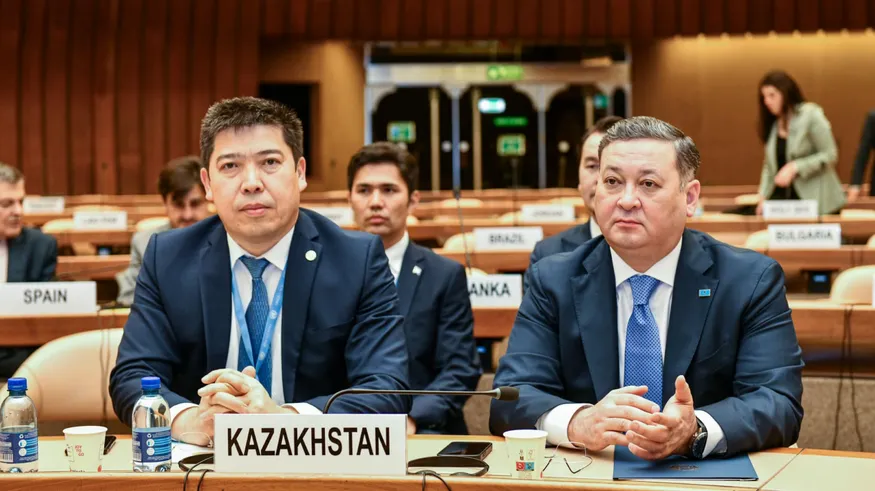On February 27, Deputy Prime Minister – Minister of Foreign Affairs of the Republic of Kazakhstan Murat Nurtleu took part in the High-Level Segment of the Conference on Disarmament in Geneva, QazMonitor reports citing the press service of the Ministry of Foreign Affairs.
In his statement, the Kazakh Foreign Minister stressed the importance of the Conference on Disarmament, which remains the sole multilateral forum for negotiations on disarmament.
The Kazakh diplomat noted that in modern geopolitical conditions, disarmament issues are especially important for promoting dialogue based on the UN Charter and international law.
Minister Nurtleu emphasized that nuclear disarmament is an unchanging priority of Kazakhstan’s foreign policy.
He stated that our country would chair two of the most important multilateral forums — the Second Preparatory Committee of the Review Conference of the Treaty on the Non-Proliferation of Nuclear Weapons and the third meeting of the Treaty on the Prohibition of Nuclear Weapons — and would also host the meeting of representatives of all nuclear-weapon-free zones this year.
Noting the importance of strengthening the Biological Weapons Convention, the Minister called on delegations to work together to implement the initiative of the President of Kazakhstan Kassym-Jomart Tokayev to create an International Agency for Biological Safety.
In addition, as part of his visit to Geneva, Minister Nurtleu held bilateral meetings with the heads of the UN Office in Geneva and the International Labor Organization.
During the meeting with the Director General of the UN Office in Geneva Tatiana Valovaya, the readiness to reinforce interaction on all key topics of the global agenda at the Geneva-based platform was confirmed.
The parties discussed Kazakhstan's initiatives in the field of nuclear disarmament, strengthening the non-proliferation regime of weapons of mass destruction, creating the International Agency for Biosafety, as well as the Regional Center for Sustainable Development Goals for Central Asia and Afghanistan.
In this context, the Kazakh Foreign Minister noted that our country attaches great importance to the activities of the Conference on Disarmament and considers it as the only and indispensable multilateral negotiating platform in the field of disarmament, non-proliferation and arms control.
Nurtleu expressed gratitude to the Head of the UN Office for supporting the annual events dedicated to the International Day against Nuclear Tests (August 29).
During a meeting with the Director General of the International Labor Organization (ILO), Gilbert Houngbo, Minister Nurtleu informed him about the reforms carried out in the Republic of Kazakhstan in the field of legal regulation of labor relations, aimed, among other things, at expanding the protection of workers' rights, improving working conditions and increasing the minimum wage. In addition, the Kazakh diplomat announced the country’s intention to continue to bring national legislation in the area of labor rights, employment and social protection in accordance with ILO standards.
Furthermore, Foreign Minister voiced Kazakhstan’s support for the ILO chief’s initiative on the Global Coalition for Social Justice and expressed our country’s readiness to join it.
During the meeting, Nurtleu conveyed to ILO Director General an invitation on behalf of the President of the Republic of Kazakhstan Kassym-Jomart Tokayev to the Astana International Forum, to be held in June this year.
On the margins of the Conference, Minister of Foreign Affairs of Kazakhstan held separate bilateral negotiations with Foreign Ministers Nasser Bourita of Morocco, Riyad al-Maliki of Palestine, Filip Ivanović of Montenegro, Margus Tsahkna of Estonia and Hanke Bruins Slot of the Netherlands.
The parties discussed the current situation and prospects for the development of cooperation at both the bilateral and multilateral levels, including mutual support in international organizations.
The Conference on Disarmament was created in 1979 by the decision of the first special session of the UN General Assembly on disarmament, held in 1978. The CD is the successor to the Ten-Nation Committee (1960), the Eighteen-Nation Committee (1962-1968), and the Conference of the Committee on Disarmament (1969-1978). Currently, CD is comprised of 65 Member States. The Conference traditionally meets at the Palais des Nations in Geneva (Switzerland).
